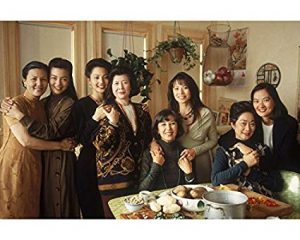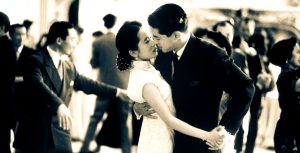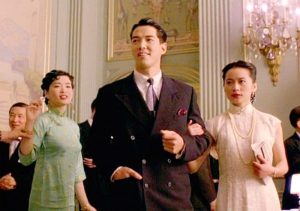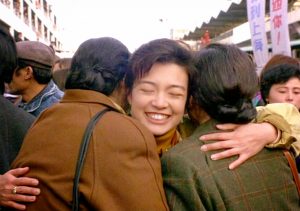When I told my mother I decided to attend a university in the United States of America, the first thing that came out of her mouth was: “Why do you want to get away from us?”. Don’t get me wrong, my parents are the smartest, most amazing, powerful, and strong people I’ve ever met, but with this move I touched their pride. For my whole entire first semester at OWU they did not speak to me unless it was an emergency.
In the movie the Joy Luck Club, pride is a big theme. Nothing is as strong as a bond of a family, and at end of the day nobody can break a relation like that. However, tradition, history, and age differences can put a strain on or lack of communication and result in problems for the whole entire family.
The Joy Luck Club takes place in San Francisco in the 1990s. It is about 4 Chinese women, that have gone through hell and back to create a good future for their daughters in America. They met while playing mahjong, and bonded over their struggles while living in China, emigrating and finding love in the United States.
 (Joy Luck Club, 1993)
(Joy Luck Club, 1993)
The movie starts with the death of one of the women, Suyuan Woo. Her daughter, June, threw a party for the whole Chinese community to celebrate her mother. There are traditional Chinese dishes, but also American drinks, and Caucasian members are part of the group. During the celebration Suyuan Woo’s friends, also known as the “aunties”, Lindo Jong, Ying-Ying St. Clair, and An-Mei Hsu, start playing mahjong, and there is a seat free. While June is pouring out tea to her aunties, she realizes that it is expected from her to join the game. She is wearing her mother’s jewelry after all, and has taken her place in all the other positions of the community.
During the game June looks back at her mother’s life, and realizes that she did not know anything about her at all. A few weeks before the party, she discovered that her mother was married before coming to America, and that she has twin half-sisters. She got a letter from them, and is travelling to China to be able to get to know that part of her mother. At the end of the movie, she talks to her father whom picked out some pictures to show her new-found siblings. He tells that her mother got diphtheria, and that is why she had to leave the babies. She was afraid she would infect, and kill them. After having to leave her girls, her mother swore to herself that this would never happen again. Unfortunately, in striving to achieve that goal Suyuan made June feel like she was not a good daughter. It clearly shows that the ideology of a traditional Chinese mother born in the 1930s and experiencing the horrors of the Chinese War, is very different from her Americanized daughter who can’t even speak Chinese. June realizes that the hate her mother always seem to have against her and the world, was because she felt that she came short for everyone.
Returning to the game of wahjong, we looked at Lindo Jong and her daughter Waverly. Lindo is going to the kitchen to finish some dishes and asks her for help. Waverly just got remarried to a non-Chinese man, and dated him for 2 years before introducing him to her parents. When she took him to their house for the first time, she had taught him some etiquette rules but he made some big faux passes. Waverly thinks her mom hates him, and after she got engaged she did not want to tell her family. When Lindo and Waverly go to the hairdressers together before the wedding, Waverly suddenly breaks down, and asks her mother why she is never good enough for her. Lindo looks back and tells her the story of her first husband. She got betrothed when she was 5 years old. After that she was always just seen as an object that had to be kept safe until it was time to give it away. It was an unhappy marriage, and Lindo managed to get out of it by scheming up a visit from her husband’s ancestors. She moves to Shanghai, and later on emigrates to the US. Just like Suyuan, she promises herself that her children will have the best possible lives and that she will push them to be amazing human beings.
 (Joy Luck Club, 1993)
(Joy Luck Club, 1993)
The two other women, Ying-Ying and An-Mei, went through similar hardships. Ying-Ying was from a rich Chinese family, and met her future husband when she was 16 years old. In the beginning he seemed kind and understanding, but after they got married and she has a baby boy, she realizes that he has been cheating on her the whole time. During the party of the christening of their son, he is flirting with an opera singer. After that everything escalated very quickly, he starts to emotionally and physically abusing her. Ying-Ying gets depressed, and in one of her manic episodes she drowns her baby. 20 years later she moved to America, remarried, and had a daughter. Her spirit in life, however, never came back. She thinks that is the reason why Lena, her daughter, has no opinion or backbone.
Lastly, the fourth member of the Joy Luck Club was An-Mei was part of a happy family at first. Her dad passed away, and her mom had an affair with a rich business man afterwards. She got pregnant, and they had to move in with him and his 3 wives. The second wife tricked her mother into having to give up the baby, a boy, to her. An-Mei’s mother gets depressed and kills herself by eating sticky rice balls laced with opium. An-Mei is an orphan now, but the guilt and fear the second wife feels, makes her take care of An-Mei very well. She ends up moving to America, marrying, and her daughter, Rose, even attends college. While Rose is in college, she meets the son of a media CEO. They hit it off immediately but his parents don’t think she is part of the “right” race. He protects her against them, and eventually they get married. After a while they hit a rough patch, but at June’s party they seem to have reconciled.
 (Joy Luck Club, 1993)
(Joy Luck Club, 1993)
Food does not seem to play a big role in the movie. It appears occasionally, and was the most prominent in the scene where Waverly introduced her Caucasian boyfriend for the first time. It was closely intertwined with Chinese tradition and authenticity. He could not eat with chopsticks, and did not understand that it is common in every Chinese dinner party to compliment the dish that the hostess says tastes the worse. Instead of complimenting her, he said a little soy sauce would do the trick just fine.
The connection to the materials we studied, were very subtle. As previously mentioned, tradition and authenticity were the main discussion points of the film. The difference between a traditional Chinese family and upbringing, and an American-Chinese one were very well pictured. The difference in taste was discussed during the soy-sauce accident. Lastly, the main factor of all the family drama, were differences in ideologies and age.
In my opinion, it seemed that the main goal of this movie was to show that everything happens for a reason, and that most people are just like their parents. As long as your communication is good, you can fix any drama or problem. The movie may have been a little long, 2 hours and 10 minutes, but was worth it. Unfortunately, the Joy Luck Club was not on Netflix, so I had to stream it online. Hopefully the American government will not find out.
 (Joy Luck Club, 1993)
(Joy Luck Club, 1993)
References
Tan, A. (1990). The Joy Luck Club. London: Reed Consumer Books
Tan, Wang, Bas, Markey (1993). The Joy Luck Club.